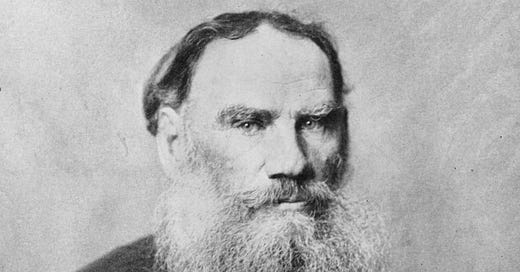Tolstoy on Goals
This is about how our brains work. We struggle to comprehend big numbers and long timeframes.
“A man on a thousand-mile walk has to forget his ultimate goal and say to himself every morning, ‘today, I’m going to cover 25 miles and then rest up and sleep.’” This Tolstoy quote gets at something most people struggle with: the gap between having big goals and actually achieving them.
Here's what usually happens. Someone decides they want to write a book, start a business, or get in shape. They picture the end result and feel motivated. Then they sit down to actually do the work and realize how far they have to go. The distance between where they are and where they want to be feels impossible to cross. So they quit. Tolstoy understood that big goals are paradoxical. You need them for direction, but thinking about them too much will crush you. The thousand-mile walker who spends his day obsessing over the 975 miles he still has left will never make it. But the one who wakes up and says, "I just need to walk 25 miles today," has a chance.
This is about how our brains work. We struggle to comprehend big numbers and long timeframes. A thousand miles feels abstract and overwhelming. Twenty-five miles feels concrete and doable. Same destination, completely different psychology. The smartest part of Tolstoy's insight is the rest component. The walker doesn't just focus on daily progress. He plans to rest and sleep. Most people trying to achieve big things burn themselves out because they think success requires constant intensity. But intensity without recovery is just a recipe for quitting. As Brad Stulberg told me on The Learning Leader Show, “Stress + Rest = Growth.”
Compound interest works because it's boring and consistent. The same principle applies everywhere. The person who writes 300 words every day for a year ends up with a book. The person who saves a small amount every month for decades ends up wealthy. The person who exercises regularly without heroics stays healthy. Big achievements look impressive from the outside, but they're usually just the visible result of many small, unremarkable daily decisions. The magic isn't in the destination. It's in making tomorrow's 25 miles feel as manageable as today's.


